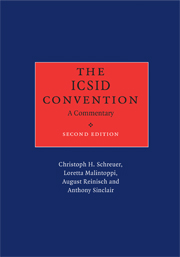Book contents
- Frontmatter
- Contents
- Foreword by Professor Sir Elihu Lauterpacht, CBE, QC
- Authors' preface to the second edition
- Table of cases
- List of abbreviations
- Text of the ICSID Convention
- Procedural calendar
- PREAMBLE
- CHAPTER I International Centre for Settlement of Investment Disputes
- CHAPTER II Jurisdiction of the Centre
- CHAPTER III Conciliation
- CHAPTER IV Arbitration
- CHAPTER V Replacement and Disqualification of Conciliators and Arbitrators
- CHAPTER VI Cost of Proceedings
- CHAPTER VII Place of Proceedings
- CHAPTER VIII Disputes between Contracting States
- CHAPTER IX Amendment
- CHAPTER X Final Provisions
- Final Clause
- Consolidated bibliography
- Index by article
- Index by subject
Authors' preface to the second edition
Published online by Cambridge University Press: 07 September 2010
- Frontmatter
- Contents
- Foreword by Professor Sir Elihu Lauterpacht, CBE, QC
- Authors' preface to the second edition
- Table of cases
- List of abbreviations
- Text of the ICSID Convention
- Procedural calendar
- PREAMBLE
- CHAPTER I International Centre for Settlement of Investment Disputes
- CHAPTER II Jurisdiction of the Centre
- CHAPTER III Conciliation
- CHAPTER IV Arbitration
- CHAPTER V Replacement and Disqualification of Conciliators and Arbitrators
- CHAPTER VI Cost of Proceedings
- CHAPTER VII Place of Proceedings
- CHAPTER VIII Disputes between Contracting States
- CHAPTER IX Amendment
- CHAPTER X Final Provisions
- Final Clause
- Consolidated bibliography
- Index by article
- Index by subject
Summary
The Convention on the Settlement of Investment Disputes between States and Nationals of Other States (the ICSID Convention) entered into force on 14 October 1966. It provides for the settlement of disputes between host States and foreign investors through arbitration or conciliation. These procedures are administered through the International Centre for Settlement of Investment Disputes (ICSID, or the Centre).
The ICSID Convention was conceived by the Directors of the World Bank as an instrument of international economic development. Dispute settlement under the Convention offers advantages to the host State as well as to the investor.
By offering arbitration, the host State improves its investment climate and is likely to attract more international investment. In addition, by consenting to ICSID arbitration the host State protects itself against other forms of foreign or international litigation. The host State also effectively shields itself against diplomatic protection by the State of the investor's nationality.
The investor gains direct access to an effective international forum should a dispute arise. Thus, the possibility of going to arbitration is an important element of the legal security required for an investment decision.
During its early years the use of the dispute settlement procedure created by the ICSID Convention remained scant. Yet, over the years ICSID's case load has increased dramatically. This has been due particularly to consent to arbitration based on treaties. At the time of writing, ICSID's website listed 153 concluded and 120 pending cases.
- Type
- Chapter
- Information
- The ICSID ConventionA Commentary, pp. xi - xiiPublisher: Cambridge University PressPrint publication year: 2009



